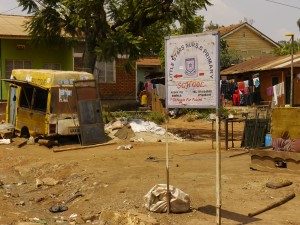Gihembe Refugee Camp, Rwanda
by  Rose Pescod, MSc International Disaster Management
Rose Pescod, MSc International Disaster Management
Predominantly it had been the media, in particular images published by the media, that had informed me of the terrible conditions endured in refugee camps globally. So it was with some trepidation that I made the bus journey to Gihembe refugee camp, Rwanda in January 2016 as part of my MSc International Disaster Management to explore ‘Humanitarianism in Practice’. Images of children suffering from malnutrition and adults with chronic untreated illnesses dominated my thoughts, whilst I deliberated how I would respond to the camp conditions and whether my reaction would be predictable or appropriate.
We arrived in Gihembe and were greeted immediately by the camp supervisor; an approachable, inviting young man with a ready smile. He had come to the camp on his day off to give us a tour and answer any questions that we had. He explained that the camp had been there for 17 years and that almost 50% of the refugees had been born there. Interestingly, he stated that all refugees born there, took their nationalities and identities from their parents and not necessarily from their current country of residence.
When he confidently stated the health status of the camp was good, I was initially sceptical. However, as we walked to the health centre, the children that greeted us were full of energy, skipping alongside us with bright, wide, white toothy smiles. We learnt there is a successful nutrition programme that provides supplements to children up to the age of 3 years and to encourage school attendance, the camp provides a 10am cup of porridge for the children attending. It should be noted that the HIV prevalence is less than 0.1%. Malaria is the main health problem in the camp, which is a disease that effects all in Africa regardless of their refugee status. As we reached the health centre, it was staffed but empty. Just three healthy newborns with their parents relaxed in the maternity wing. I was impressed.
However, one comment made by the camp leader really caught my attention. He claimed that only 9 refugees in a camp that housed over 14,000, suffered from mental health problems. Nonetheless, he did acknowledge that an unspecified number of refugees struggled with drug and alcohol abuse. I found these two pieces of information conflicting and misleading. They prompted me to ponder how do they define mental health problems in Rwanda? Were these patients that had exhibited signs of psychosis? Or just those who had been brought to the attention of the medical professionals on site? It seems unlikely that in a camp of 14,000 vulnerable people that only 9 had been identified as needing support. I found it worrying and strange that the camp seemed to think of drug and alcohol abuse and mental health as two separate problems with no link. Had we had been able to question the medical staff, I wonder whether they would have offered the same information?
I found visiting Gihembe an enjoyable and informative experience. It has altered my opinion about refugee camps considerably and I look forward to furthering my knowledge, in particular with regards to mental health support. I felt relaxed during the visit and I had no cause to worry, my automatic reaction was to mirror the smiles that were directed at me.


0 Comments